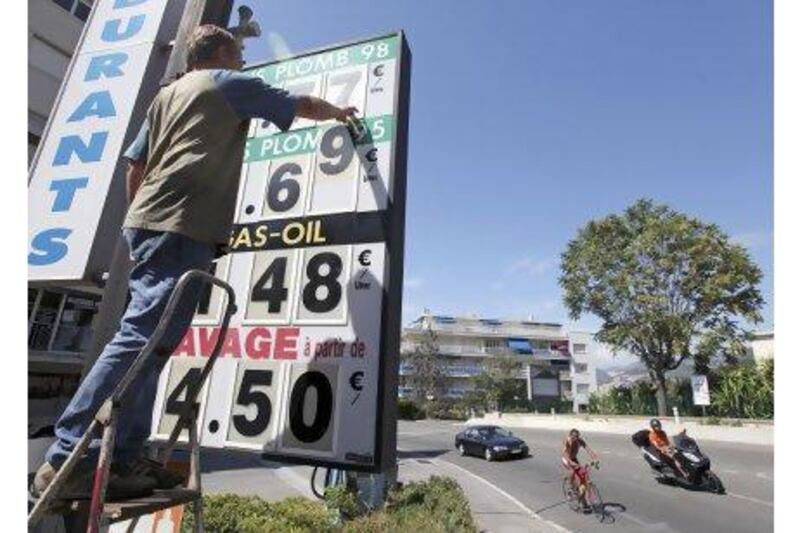The majority of vehicles on the roads in Europe's second-largest economy do not use petrol. After decades of enjoying significant price advantages at the pumps, an EU push to level rates would hit hauliers and motorists hard, Colin Randall, Foreign Correspondent, reports
As residents of the UAE quickly learn or are reminded when travelling to Europe, the driver pulling into a petrol station expects to have to dig deep into the pocket.
There is a morsel of consolation if the vehicle happens to be diesel-fuelled and the forecourt is in one of the many countries where petrol is far more costly.
In France, the average saving on lead-free petrol is a useful 20 centimes (94 fils) a litre. But it is a sweetener that may be about to turn sour.
More than 80 per cent of the fuel used on French roads is diesel and this is the fuel that powers 73 per cent of the new cars registered last year.
Removing or even substantially reducing the price advantage may sound like electoral suicide for a left-wing president and government already struggling for popular approval.
But in a move that would fire up costs for hauliers as well as private road-users, François Hollande's administration is under pressure - from its own financial watchdog as well as the European Union - to equalise petrol and diesel prices.
Pierre Chasseray, the head of a motorists' lobby group representing 320,000 car-owners, was speaking with tongue in cheek when he told French media harmonisation was perfectly acceptable - provided the cost of petrol simply came down. As he - and any student of basic economics practice - knows, the reality would be diesel prices shooting up.
The privileged status of the French motorist using diesel is matched in other European countries.
There are exceptions. Britain, where diesel is more highly taxed than petrol and is always more expensive, by as much as £1 (Dh5.57) for every couple of gallons. Romania, Hungary and Cyprus are also nations where motorists also face steeper bills for diesel, although without the tax being greater.
Recent comparisons from the European Commission illustrate the widespread tendency for diesel to be cheaper, from marginal differences in Sweden and Austria to as much as 31 centimes per litre in Greece and the Netherlands.
It is a benefit French drivers were encouraged to embrace and one they very much want to hold on to.
The impetus for price parity reflects EU thinking, driven by concerns about the diesel's role in causing pollution and threatening public health. But it comes in France's case from the august cour des comptes, a government body that audits public institutions.
The court is more troubled by public debt than electoral inconvenience and believes the measure could, at a stroke, produce revenue of €7 billion to €8bn a year.
Fuel duty has been lower for diesel in France for decades, an anomaly rooted in the country's traditionally fierce defence of its agricultural sector. This, in turn, has led French refineries pointing out that demand far exceeds what domestic producers can supply.
The French lobby group for petroleum industries (UFIP) estimates that while France last year had net petrol exports of 4 million tonnes it imported five times as much diesel, with total consumption reaching 38 million tonnes after a year-on-year increase of 7.5 per cent.
Jean-Louis Schilansky, the president of UFIP, said on France-Info radio the respective tax duties should be "gradually rebalanced" to give French manufacturers - market leaders for diesel vehicles - and motorists time to adapt. "We have gone too far in France," he said.
He argued that refineries, currently hit by overcapacity amid falling exports, would receive a much-needed boost if diesel lost its price advantage.
"Every cubic metre of gasoline that we would sell in France instead of exporting it would add more profitability to refineries," he said.
In its report to the French economy and ecology ministries, the cour des comptes said energy fiscal policy paid more heed to the concerns of vested interests than to government objectives. The structure of state expenditure accordingly failed to contribute to the encouragement of a strategy of energy transition, it added.
Ministers are divided on the issue. Delphine Batho, environment minister, said tax increases on diesel were inevitable, mainly on health grounds, although she acknowledged the need to protect the purchasing power of people living in suburbs and the countryside.
"That means the evolution of the duty of diesel must first of all [be achieved] in a progressive fashion, and must above all be accompanied by measures on social justice."
But Frédéric Cuvillier, the transport minister, said he opposed a re-alignment of fuel taxes because of the impact on competitiveness in such sectors as road transport.
Arnaud Montebourg, the minister for industrial recovery, cautioned against raising revenue for the state by higher taxes that would damage French manufacturers.
He said new diesel cars sold in France were fitted with effective pollution filters. Rather than take action that would benefit foreign car makers, he said, one answer could be to introduce a programme encouraging vehicle owners to replace older vehicles more liable to cause pollution.
Harlem Desir, the first secretary of the ruling socialist party, called on ministers to avoid disunity and insisted on France-Info upping tariffs was not the answer.
"We can't have more taxes. No increase is planned … we can't create worry or anxiety among the French. We have to reconcile public health, ecology and industry and jobs," he said.
Ringing in the ears of the president Mr Hollande, whose personal approval rating has slumped to 35 per cent in recent polling, will be another survey of public opinion showing nearly three quarters of those question opposed raising the cost of diesel.
That is a sentiment he may feel he would ignore at his peril.






